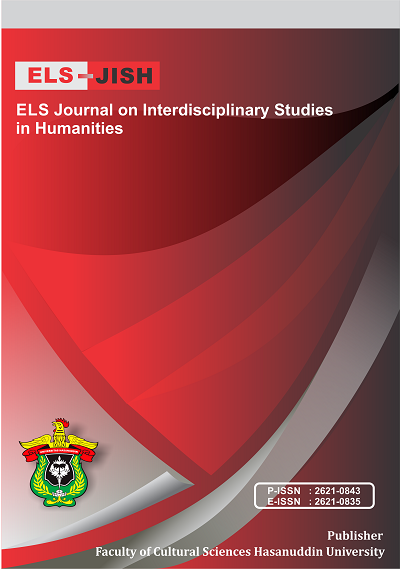Pronunciation Error Made During English Presentation by English Department Students at FKIP UNSULBAR
DOI:
https://doi.org/10.34050/elsjish.v6i2.26887Keywords:
English Learning, Difficulty, PronunciationAbstract
Learning a second or foreign language (L2), students ought to be capable in the capabilities. Most of the time, learners of L2 should first learn linguistic competence, which includes knowing how to speak, use words, and grammar. Pronunciation issues, particularly when it comes to articulating diphthong sounds, may be a problem for the majority of undergraduate students. Despite the fact that the lesson was covered in class, some students struggle to pronounce it correctly. The researcher analyzed which pronunciation errors students make when speaking in presentation class, the subsequent research of this study focuses on the analysis of the words that undergraduate students from Universitas Sulawesi Barat pronounce. This study was aimed to examine students' mispronunciation of various English words in recognition of the significance of improving pronunciation. Descriptive methods were used in this study, which took a qualitative approach. The researchers described the outcomes of their data collection using this descriptive approach. Enlightening technique picked by the researcher since this strategy gave a detail image of the individual, the condition of language, side effects or gatherings contemplated. Universitas Sulawesi Barat because the researcher wants to know which pronunciation mistakes students make when speaking in presentation class. English pronunciation errors pronounced by students such as, presentation (/ˌprez.ənˈteɪ.ʃən/), communication (/kəˌmjuː.nəˈkeɪ.ʃən/), made (/meɪd/). Those words have mispronounce that were made by the students. Besides, there were some difficulties that students had. They were Paucity words, a lack of confidence in pronunciation, never practice, lack of English grammar and others.Downloads
References
Aktuğ, B. (2015). Common pronunciation errors of seventh grade EFL learners: A case from Turkey (Master's thesis, Middle East Technical University).
Alimemaj, Z. M. (2014). English phonological problems encountered by Albanian learners. European Scientific Journal, 10(8).
Astuti, A. W. (2016). It is Important to Learn English Pronunciation as Foreign Language (Doctoral dissertation, Thesis of Serjana).
Aswad, M., Rahman, F., Said, I. M., Hamuddin, B., & Nurchalis, N. F. (2019). A software to increase English learning outcomes: An acceleration model of English as the second language. The Asian EFL Journal, 26(6.2), 157.
Fitria, A. L. (2014). The Errors of English Pronunciation on Vowels Made by The Second Year Students at SMPN 2 Menganti, Gresik (Doctoral dissertation, UIN Sunan Ampel Surabaya).
Harmer, J. (2007). The Practice of English Language Teaching. Harlow: Pearson Longman Limited.
Hartoto, H. Y. (2010). The errors of English pronunciation among the second grade students of Tersono Junior High School Tersono Batang. Universitas Negeri Semarang Repository.
Hassan, E. M. I. (2014). Pronunciation problems: A case study of English language students at Sudan University of Science and Technology. English Language and Literature Studies, 4(4), 31.
Hasnia, H., Andini, C., Tahir, M. D., Hunaeni, H., Zulfikariandi, Z., & Muslimin, M. T. (2022). The Ability of 1st Class Students of SMAN 11 Enrekang to Arrange Verbal and Nominal Sentences. ELS Journal on Interdisciplinary Studies in Humanities, 5(3), 539-550.
Na’ama, A. (2011). An analysis of errors made by Yemeni university students in the English consonant-clusters system. Damascus University Journal, 27(3), 145-161.
Rahman, F. (2018). The Constraints of Foreign Learners in Reading English Literary Works: A Case Study at Hasanuddin University. Journal of Arts and Humanities, 7(2), 01-12.
Riadi, A., Rufinus, A., & Novita, D. (2013). Students' Problem in Pronouncing Short and Long English Vowels. Pontianak: Tanjungpura University.
Riyani, I. O. (2013). An analysis of pronunciation errors made by Indonesian singers in Malang in singing English songs (Doctoral dissertation, Universitas Negeri Malang).
Rustamov, I. (2022). Teaching English as a Foreign Language. Журнал иностранных языков и лингвистики, 4(4).
Sembiring, N., & Ginting, F. Y. A. (2016). An analysis of pronunciation errors made by the fourth semester students of English Education Study Program at UNIKA. Jurnal Suluh Pendidikan, 3(1).
Weda, S., Atmowardoyo, H., Rahman, F., Said, M. M., & Sakti, A. E. F. (2021). Factors affecting students’ willingness to communicate in EFL classroom at higher institution in Indonesia. International Journal of Instruction, 14(2), 719-734 .
Yiing, I, K, C. (2011). An Analysis of Pronunciation Errors in English of Six Utar Chinese Studies Undergraduates. Universiti Tunku Abdul Rahman.
Downloads
Published
How to Cite
Issue
Section
License
Copyright (c) 2023 Asdar, Hustiana, Husnul Khatimah Nur

This work is licensed under a Creative Commons Attribution-ShareAlike 4.0 International License.

















